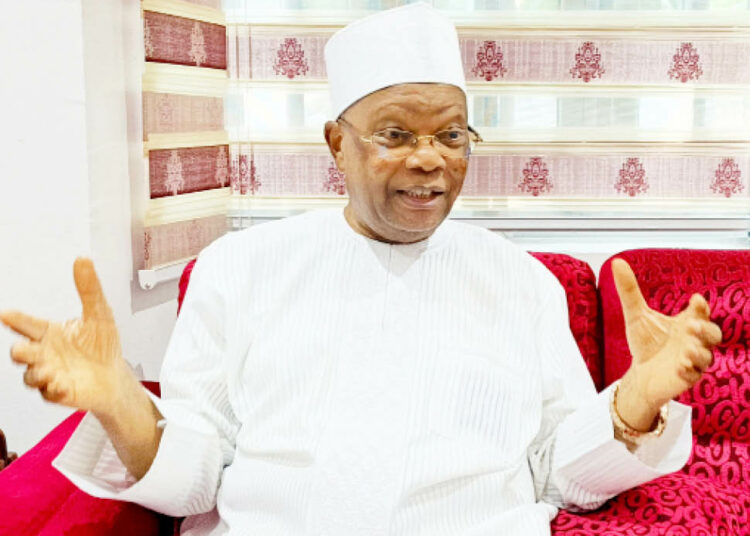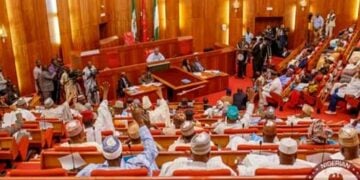On August 2, 2025, a former Minister of Health and Doyen of all Rotary District Governors, Prince Julius Adelusi-Adeluyi, will turn 85. In this interview with GEORGE OKOJIE, he reflects on the dynamics of Nigeria’s socio-political development and other issues.
You were a very active student union leader. You are widely acknowledged as the Doyen of all Rotary District Governors. What motivated you?
I was brought up in an environment of service. I am wired to provide service in various ways, which I am doing through the various organisations I belong to. So, right from my youth, I have been involved in service organisations and the students ’ union — at the primary, secondary and tertiary levels.
When I was in secondary school, for example, I wrote plays, conducted, and directed them. When I got to university, I ventured into the Arts and got involved in student politics. It was the student politics aspect that exposed me to the world. I’m sure you’ve heard of the National Union of Nigerian Students? It’s now NANS, right? I was Vice President for International Affairs of NUNS—National Union of Nigerian Students at that time. So I represented Nigeria as a young man at the university in more than 17 countries at youth conferences all over the world. By the time I was finishing university, I was already attending international conferences on behalf of Nigerian students.
So, it was in New Zealand, at a world conference of students, that I was elected to represent Africa in the World Student Secretariat in Holland. I became Secretary-General of the organisation. That’s how I travelled around the world—143 countries. When you travel like that, you become a different person. So that’s the first thing: student unionism.
Then I came back and joined Rotary. So, when people say I was the first African to be president of Rotary, they confuse me with that. I was the first African to be Secretary-General of the World Student Movement.
As for Rotary in Nigeria, when Rotary finally became a district in Nigeria, I was the first District Governor. That’s why people call me the Doyen of all District Governors in Nigeria. When I became Governor—I’ll show you some pictures—the installation was carried out by the President himself, Alhaji Shehu Shagari. He was there.
Briefly, therefore, I have to use the term “public-spiritedness.” And following the ideal of service, knowing that he profits most who serves best—that’s what drives me.
I got there young, I stayed there, and I’m still there now. Whatever I do is about service. It’s not about big business. It’s not about big politics. It’s about making people realise that you cannot be an island unto yourself—and that you must be able to give a hand. Nobody is so poor that they can’t give a hand at any given time.
You have spearheaded initiatives that support education, health, youth empowerment, and helping vulnerable individuals. How do you assess the current level of youth involvement in politics?
I think the youth today in politics are doing better than we assume. The youth are a newer generation of the older generation. When we were younger, we were also youths. And we tried our best to create awareness about what was going on.
I remember I was the Vice President of the National Union of Nigerian Students. I participated in a demonstration from Ibadan to Lagos against Nigeria making a pact with Britain—trying to put a British military base in Nigeria. There was a ‘No Pact, No Base’ demonstration here in Lagos. And it went very well. The police arrested some of us. In those days, that was novel.
But the environment now is such that I believe the youth are living in a more challenging space. They, for example, did something about the Not Too Young To Run bill in 2018, if you remember. That was the beginning of their involvement—individually and collectively—in politics. That must be encouraged.
The UK plans a law that will reduce the voting age to 16. Is it something worth emulating?
Yes, of course. We shouldn’t just say “emulate,” but I do think it’s a good idea. We can bring it into our midst. You remember now that the Federal Government is already talking about 16 as the entry age for universities. In those days, such discussions were unheard of. They made exceptions only for the exceptionally brilliant. But I suppose now we are getting more defined.
So, it’s good for them in Britain. It’s something we can also work towards here. Why not? If you look at the under-30 population in Nigeria, it’s about 60% of the country. Right? And if the voting age is reduced, more people will join the youth band and participate in the political process. I think it’s the right thing to do.
Do you share the view that the older generation has significantly destroyed the foundation on which the youth today can build a suitable future?
Who is the older generation? Who is the younger generation? It’s a continuum. We can say that the so-called older generation lost growth opportunities. But we cannot keep blaming others for our current lot.
In 1966, the soldiers blamed the politicians. Before 1960, the politicians blamed the British. When the democrats came, they no longer blamed the military—they blamed the British. Today, we also blame others. The blame game must stop. You cannot drive a car while constantly looking in the rear-view mirror. You must face the future.
If I may say something—it’s a very family thing. Every organisation, every individual in the world is controlled by what I call the three Cs: Chances, Choices, and Consequences.
In 1960, we became independent. Nigeria was on top of the world. That year, the whole world noticed Nigeria. Books like The Dream of Nigeria were written by Sam Epelle. On October 7, 1960, Tafawa Balewa led a delegation to the United Nations. Nigeria was formally accepted as the 99th member of the UN. It was a moment of great pride. Everything came together to make Nigeria a fantastic place. And we were fortunate to have Tafawa Balewa—one of the best English speakers of the time. The voice, the personality, the glamour—he made Nigeria proud.
As journalists, we must always refer to his speech on October 7, 1960. He made many promises. At that time, Nigeria had many choices. But based on the choices we made, we are now living with the consequences.
Other countries with the same chances made different choices—and now have different outcomes. Take Saudi Arabia for example. They once came to us for assistance with health. Today, we go there. Instead of saying “the old people ruined it,” it is time for us to rejig, to reflect on our current chances—and make wise choices for better consequences.
Service organisations like Rotary, where you played a major role, are not as vibrant and relevant as they used to be. There appears to be a growing interest in Africa, but membership is down 20% in North America. Why?
We have to be careful with the statistics. Rotary started in America. It didn’t start in Ughelli. It didn’t start in Benin. It started in America—over 100 years ago. It spread because many people were there. It only spread to Africa in 1921 and didn’t get to Nigeria until 1961.
In Nigeria, because of Rotary’s administration at the time, 16 West African countries were grouped into one zone. That’s why, when I was elected governor of these 16 countries, I asked, “Why?” Why can’t Nigeria be in one zone? I fought for that, and eventually, it was agreed—Nigeria became a district on its own. That was a breakthrough.
So yes, Rotary is growing in Africa. More people are joining. But the numbers in the Northern Hemisphere are naturally larger—it started there. Same with faith-based organisations. In the UK and the US now, many churches are empty. But in Africa, churches are growing. The same thing applies to Rotary.
Membership may not be growing here as fast as projected—mainly because of economic reasons. If, for example, your subscription fee was $1,000 before, that was maybe ₦50,000 when the exchange rate was ₦50 to $1. But now, at ₦1,600 to $1, $1,000 is ₦1.6 million. You want to join? You can’t. That’s why membership isn’t growing as fast as it should.
Sir, in the current dispensation of instant gratification, is there still a role for service in the future?
In this world of instant gratification, everybody wants to grab. But instant gratification isn’t truly a global phenomenon—it’s more prevalent in our environment. In other words, people now do things only if there is an immediate reward. The older generation didn’t operate that way. We didn’t do things for instant gratification.
Why?
Because back then, we had values. People acted based on conviction, on what they believed in—not because they were expecting a quick payoff. Unless and until we address our values, nothing will change. We cannot fix this overnight. But it is possible to change.
Even if a good man becomes President of Nigeria today—by whatever means—he’ll still be blamed tomorrow for not doing enough. People will continue running to Europe and America because those places have good roads and uninterrupted power. They had chances. They made choices. And now, they are enjoying the consequences: infrastructure, order, opportunity.
We also had our chances. But we chose to steal everything. And now we are facing the consequences. That’s the truth. Everywhere you go in Nigeria today, there are difficulties. But things can change—and they will change.
What I want to tell people is this: we are not the first country to face hard times. It’s not something that can be resolved overnight. Look at countries like China, Germany, Korea, Japan—even France. What did they do? They started with the young generation.
So, I recommend that Nigeria take a hard look at itself. We must take a deep breath, evaluate the chances before us, and ask the fundamental question: Where are we going? We need a vision. We need visionary leaders. What was the vision of the man in Dubai 25 years ago? It was a desert. But he had a vision. What about Saudi Arabia? Also a desert. China? Look at where they are now. Russia? Same thing.
So, we must articulate a national vision and begin to apply it—across the board. At the primary school level, we should be selling that vision to every child. Imagine a child in Agenebode, Edo State singing the national anthem and already being taught that Nigeria is on a defined path, and that every citizen has a role to play.
Even in churches and mosques, religious leaders must begin to preach not just spiritual salvation but national transformation. We must embed that vision in every institution. That’s the first point.
But it must be a long-term programme—not this four-year election cycle nonsense. No angel can fix Nigeria in four years. Most politicians spend the first two years planning for the next election. Nothing gets done. The cycle repeats itself: chances, choices, consequences.
So, we must sell this vision to children from the primary school level and track it for at least 10 years. By 2035, we will then have a generation that has passed through primary, secondary, and tertiary education with a transformed mindset.
Why is this important?
Because unless we have people who believe in Nigeria,—people who trust Nigeria—we will keep running in circles.
Second, we must instill values in the younger generation. No matter how difficult the situation is, every young person must learn this: you can be born in Ajegunlé and still become Head of State. It is not magic. It’s possible.
Every youth must believe in themselves. Go to school, do well, graduate. No matter the challenges. You’re not the first to face difficulties. But don’t just stop at one qualification. Don’t say, “I’m a journalist,” and assume you’re ready for the world.
Your education must be broad-based. If all you have is a hammer, everything will look like a nail. If all you know is law, every issue becomes a constitutional matter. But if you’re broadly educated, you’re more adaptable.
That’s how real leaders are formed. Someone who does well in his chosen field and still has knowledge in others — like journalism, economics, or international relations. People like that tend to succeed.
Look at the Chief Obafemi Awolowo. He worked in the civil service, he was a produce buyer, and he did so many things. Nnamdi Zik was the same. These were leaders shaped by varied experiences and strong education. That’s what we need again.
We must also tell young people that beyond education and knowledge, they need character. One of Nigeria’s biggest problems today is the lack of people with character.
When people see someone with wealth, they envy him. When they see someone intellectually successful, they respect him. When someone is in political power, they fear him. But only a person of character is trusted. And trust is everything.
Look at the late President Muhammadu Buhari. He got 11 million votes when he ran for office because people trusted him. Today, that trust has eroded. We now have a serious trust deficit in this country.
So, as a young person, you can choose to develop yourself into someone with character. Combine education, knowledge, and character—that is what the future demands. These are the qualities we must nurture in the next generation.
We’ve got the edge. Get real-time reports, breaking scoops, and exclusive angles delivered straight to your phone. Don’t settle for stale news. Join LEADERSHIP NEWS on WhatsApp for 24/7 updates →
Join Our WhatsApp Channel










